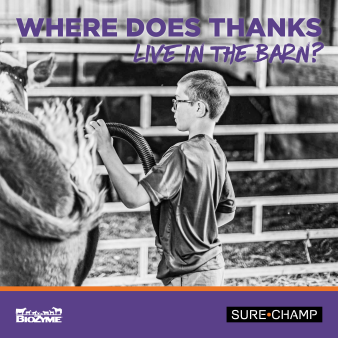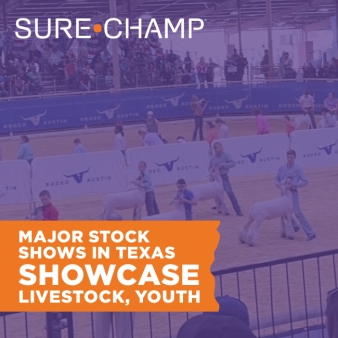
Young livestock exhibitors wear many hats. Not only do they provide the daily care for their animals, feeding, washing, exercising and monitoring their health and well-being, but these young exhibitors become spokespeople for the industry they are passionate about. With a fraction of the population engaged in production agriculture, livestock enthusiasts make up a minute percentage of the people who must share the story of how safe, nutritious, delicious protein is raised.
Most people agree there is no one better to share agriculture’s story than the youth who are passionate about the daily care of animals, and it is best when those individuals share their stories with others not familiar with agriculture and work to ensure the future of the industry. Oklahoma Commissioner of Agriculture Blayne Arthur is one leader who grew up through the ranks of youth programs like 4-H and FFA in and is now instilling the values she learned into her own children, Kelton, 13, and Kennedy, 9. Blayne and her husband Jerrod also own and operate a successful cattle operation outside of Stillwater, Oklahoma, and enjoy watching their kids and their customers’ kids succeed in and out of the showring.
“We’ve been lucky to work with some families that have been very successful, and our kids have been fortunate to have some success in the showring too. The other piece that I think is important is all the other pieces that our kids learn about hard work and responsibility, learning how to win but certainly learning how to lose as well, so we don’t think there’s any better place for our kids to be spending their time at the barn or at a livestock show,” Arthur said.
Sharing their Story at the Show
And while the Arthur kids are attending the shows throughout Oklahoma and the U.S., they have the ideal platform to educate the consumer about where and how their meat is raised safely and humanely. Arthur said with such a small percentage of the population involved in the ag industry, we must not be afraid to share our story.
“Only 2% of us are involved in production agriculture, and yet we have so many more decision makers that are from urban areas and several generations away from the family farm. I don’t think there’s any better voice to share about ag and to share about the livestock industry than our youth, because they are very immersed in the industry and their story certainly resonates with all of our urban friends. It’s really important to share with people about the ag industry because when we really open that barn door, we can explain to people why we do what we do and why it’s important that we’re working to feed the world, and we’re working to teach young people to continue to feed the next generations,” she said.
Although the Arthur family shows cattle in their home county that might be considered somewhat rural to their peers in the ag industry, it does have a very sizable urban population that includes Stillwater, home to Oklahoma State University. She has always encouraged her children to be polite to the fair goers who comment on their cattle and take time to explain their animals’ purposes to those who ask them questions knowing that the population is so far removed from agriculture. She describes one of her prouder moments from a recent county fair when observing her son, Kelton.
“There was a mother who asked my son what he would do with his steer. He explained that he had a market show he was heading to, and then we will eat him or someone else will eat him, and you could tell the mother was kind of taken aback by that. But my son was very confident in explaining that’s what we do. We raise beef cattle for people to eat. That’s an important part of the process. So certainly, it was nice to see him be able to have that conversation. We absolutely do care about our animals, that is our number one priority, but we also know that at the end of the day they’re going to be heading to somebody’s dinner plate.”
Beyond the Show Barn
Not only does Arthur praise youth programs like 4-H and FFA for teaching work ethic and responsibility, but she also said she learned valuable skills like public speaking, leadership and career development through her involvement in the Oklahoma 4-H and FFA programs while growing up. She is watching Kelton and Kennedy gain the same skills in those youth programs, as well as their participation in junior breed associations.
In addition to talking to people at shows or even through presentations at school, social media is another valuable resource available to young people to share their story. However, Arthur advises that parents should always have the final say as to what is posted online, for both the protection of the youth and the industry.
Sometimes simply sharing routine happenings on your farm or ranch on social media can be educational for the urban community that might not be aware how its food is raised, according to Arthur. Consider the “responsibilities” you take part in daily and explain that to your audience, so they gain a better understanding of the practices and terminology.
“A lot of what we would call responsibilities of taking care of livestock are really interesting to the general public, and you can explain that online. For example, this is weaning, and we do fence line weaning at our house. Or, we are castrating all the bull calves this time of year, and this is why we do that. I think the general public has a real interest and would like to have a conversation about the facts,” she said.
Take Time for Tomorrow
Arthur said one of the audiences that doesn’t get reached often enough is the legislative branch of government. As the policy decision makers, most general law makers are glad to hear from their constituents and like to know how their decisions will ultimately impact the voters and their livelihoods, especially if it involves a topic like ag, where they might not be well informed.
“All producers have a real voice as a constituent and make a huge difference for legislators. Legislators are elected to be responsive to their constituents. And a lot of times when they go to vote on any issue whether it’s an ag issue or not an ag issue, they may not hear from anyone at their district about it. So, when they have voices coming from their district, voicing either support or opposition, I can assure you that makes a difference in how they’re going to view an issue and a lot of times that makes a difference in how they’re going to vote,” she said. “I really encourage young people to know who represents them at the local level, the state level and at the federal level because those are their voices. Especially our young adults – high school, college age – them sharing their personal story and their desire to have an ag industry to go back to is very important for legislators.”
Make sure you know how to access your local, state and national legislators’ contact information, which can be found online. If there is a piece of legislation you are passionate about, be sure to contact your law maker by phone or email to share your story and let them know how his or her vote today will have an impact on your tomorrow.
Arthur says it best when she encourages young people to simply share their story. Regardless of if you are talking to an urban mom at the county fair who is wondering how you can eat the steer you raised all spring and summer or if you are encouraging a law maker to loosen regulations on production agriculture. Share your story. It’s your way of life. You’re raising food for the world, and you’re doing it with a small group of peers. Speak up, speak proud and share the story of why you do what you do every day.

